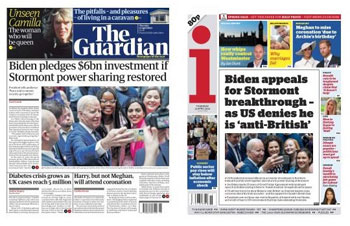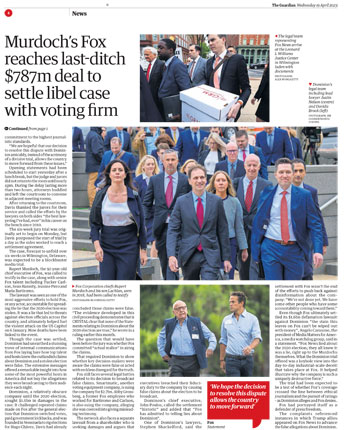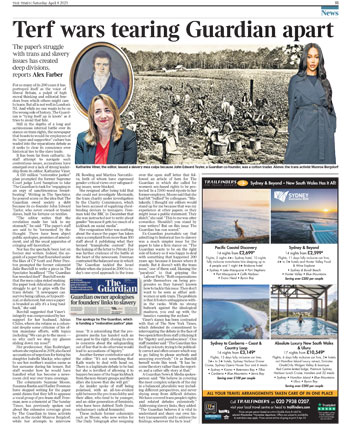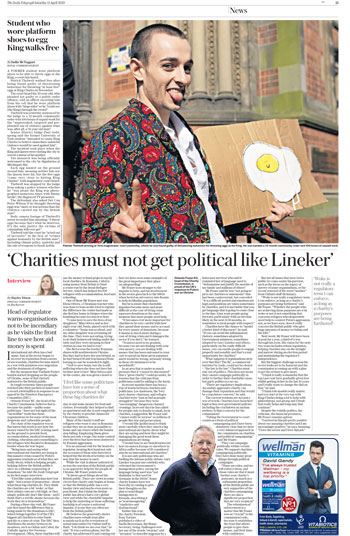
Coronation quiche

A “memory” popped up on a friend’s Facebook timeline this week. It was a letter to The Times from 2014, headlined “Anxious royalist”, which read: “Wednesday’s paper did not have a photograph of the Duchess of Cambridge. I do hope she is all right.”
Hats off to the paper for publishing it.
Nine years on, the duchess is now the Princess of Wales and no less ubiquitous. And not just Kate. With the platinum jubilee, the death of the Queen, the re-titling of Camilla, the shaming of Andrew and that fraternal rift, we’ve had an absolute feast over the past year. And now we are being drip-fed morsels about the upcoming coronation, with Tuesday’s offering the veggie quiche that has been invented to mark the occasion, as that abomination coronation chicken was in 1953 and the oranges-and-lemons trifle for the jubilee last year.
I’m quite the quiche cook, if I do say so myself, but I can’t say broad beans and tarragon appeal. What did, though, was the Mail’s headline Quiche Le Reign. The Sun had the same idea with Quiche lorreign, which may have been a bit tortured, but was definitely an improvement on the tired “Great British bake-orf” (Mirror) and quiche “fit for a king” (Express and Telegraph).
Joe who?

The big news about the event was that the Duke of Sussex is to make an appearance, but that his wife will remain at home for their son’s fourth birthday. This made the splash for the Express, Mail, Mirror, Telegraph and Sun (with a rather clever piece of work reminding us that Charles walked Meghan up the aisle).
And not only the splash for the Mail and Telegraph, but also above-the titlepiece puffs to comment pieces inside. Maybe readers were desperate to know this; there had been so much speculation that maybe this defining episode in the saga was lead-worthy. But this was also the first opportunity the press had to report on the only full day the American president had spent in the UK.
I’d have thought that Joe Biden’s whirlwind visit to Belfast to mark the 25th anniversary of the Good Friday Agreement was a slam-dunk front-page element for any newspaper worthy of the name. Apparently not. There wasn’t a word on the cover of the Telegraph, Times, Express, Mail, Mirror or Sun.
The furthest forward any of these had any Biden coverage was page 4 of the Telegraph, where the lead story was headlined “Biden doesn’t hate Britain, insists White House”. The main picture was of the President with Rishi Sunak and underneath was a comment piece by Nile Gardener with the heading “Bumbling president who sticks two fingers up at our country”. The page was completed with a set of basement double columns, one about the SNP, one a turn from a front-page story on the economy and a third in which Liz Truss accuses Biden of being part of a “co-ordinated resistance” that brought her down. I guess we can infer that the Telegraph is not a fan of Mr Biden.

But the paper’s opinion of the man is surely irrelevant? It’s the office that matters. Love him, hate him or don’t care less about him, the US president is still seen as the leader of the free world and what he says and does counts. Especially as, far from being simply a piece of history, the Good Friday Agreement is right at the heart of today’s political agenda with ramifications both domestically and internationally.

The Guardian and the i recognised this, both splashing on the visit and the president’s push for a return to power-sharing at Stormont, including, according to the Guardian, holding out a $6bn investment carrot.
Biden had said that US investors had poured $2bn into Northern Ireland over the past decade and predicted that “if things continued in the right direction”, that investment would more than triple, with “scores of major American corporations wanting to come here”.

Sounds pretty good, eh? No firm timeframe, but promising, no? So why didn’t that get the fanfare we saw, say, for the “turbo-charging” Pacific trade deal reached at the beginning of the month. The one that is expected to add £1.8bn a year to the entire UK GDP – not just one region – “over time”. Don’t answer that.
But this was day two. Biden’s arrival had warranted a splash for the Times the previous day and pictures on most front pages – apart from the Telegraph, which managed only a nib on “suspected pipe bombs” being found. That day’s splash, in common with the Mail, was the doctors’ union leader going on holiday while her members were on strike. Which, you have to admit is not exactly great timing and fair game for such treatment.

Murdoch in (some of) the news

For we media types, though, neither Harry nor Biden was the must-read last Thursday. It merited a nib on only one front page – the Telegraph – but provided page 3 for the Telegraph, Metro and Guardian (albeit a day later), and the 10-11 spread plus turn for the Mail. This was the story, according to a 6,000-word Vanity Fair feature, of how Rupert Murdoch emailed Jerry Hall “out of the blue” to tell her: “Jerry, sadly I’ve decided to call an end to our marriage.”
There was more, much more. About her spoon-feeding him back to health after he fell from a yacht, about CCTV outside her house streaming directly to Fox HQ, about ex-husband Mick Jagger organising the camera’s removal, about the divorce agreement banning her from talking to the makers of Succession, about her views on Murdoch’s relationship with Donald Trump, about hints at two-timing with Ann Lesley Smith to whom Murdoch was briefly engaged (complete with £2m 11-carat diamond ring) almost before the ink was dry on the divorce decree, about the sibling rivalry between Lachlan and James, the possibly power-play involving Elisabeth and Prudence. All allegedly, of course. All pure gold.
The timing could not have been better, coming just as the new season of Succession is getting into its stride. All the TV critics love it. But I do wonder if that’s because it’s brilliant or because, well, they would, wouldn’t they? It’s so deliciously close to home. Or because we imagine it to be close to home. The Vanity Fair feature more than reinforced that perception.
Funnily enough, though, this top-of-the-range celebrity gossip story didn’t appear in either the Sun or the Times. I wonder why.
Spoilsports

The 92-year-old Murdoch, as we see, is still with us. But what of his alter ego? If you’re a Succession fan you’ll know the answer to that. Possibly against your will. We are well into the era of watching what we want when we want to, without having to abide by the TV schedulers’ timetable. It’s been like that since the heyday of video recorders in the 80s and has developed into binge-streaming of entire series in one sitting the moment they come out. The BBC played a clever game with Happy Valley, declining to put the whole final season on iPlayer as it does with many dramas, so that the whole country was required to wait for the next week’s episode. The same applied to Line of Duty.
But what is the etiquette with such programmes with regard to spilling the beans and spoiling it for those who cannot watch the denouement along with everyone else? Well, the general rule is – rather like the football scores – to give a warning: “if you don’t want to see the result, look away now” or the punchier “spoiler alert”.
So, the reviewers are allowed their space inside, but the teasers on the front don’t give the game away. In May 2021, the Mail puffed Jan Moir on “One Helluva finale!” for Line of Duty; in February, Moir was again on hand to watch Happy Valley and give five stars to “One of the greatest finales ever seen on British TV”.
And then last Wednesday, it blew convention out of the water for Succession. What was it thinking of? Did it assume its readers were as obsessed with the show as journalists are and would be completely up to speed? But that front-page puff didn’t spoil it just for its own readers but for everyone: the twist was there for all to see on the supermarket shelves, on the TV press reviews.
More than 40 years ago, I was working at the Birmingham Post when we were going to find out the answer to the cliff-hanger, Who shot JR? Blessed with late deadlines, we hatched a plot to make contact with people in America who were about to find out and steal a march on our Fleet Street “rivals”. The scheme didn’t work out. And quite right too. I was fully behind it at the time, caught up in the excitement of a fun enterprise. But I know better now. My bit of fun would have spoilt the enjoyment for many others. The Mail is much more savvy than I was then – or will ever be – but, my goodness, it got it wrong last week.
Bang to rights

Back to the real-life “Logan Roy” and his latest adventure into the world of news-making rather than new-breaking. On Tuesday night, Fox News agreed to pay $787.5m in libel damages to the Dominion voting-machine company, just before the case was due to come to a trial at which Rupert Murdoch was to have been called as a witness.
Press Gazette editor Dominic Ponsford says he believes that it is the highest such payout in history and that in agreeing the settlement, Fox had effectively admitted not only was it wrong to allege that the 2020 US presidential election was rigged, but that it knew it was wrong when it made those claims. As Ponsford also says, the bar for libel cases is higher in America than here, since complainants have to prove malice or improper motives to proceed, so the settlement is tantamount to an acceptance that Fox was “bang to rights”.
The Washington Post reported yesterday that the payment lets Fox avoid a drawn-out spectacle, but that damage has already been done. It also points out that there’s another trial coming down the tracks. Dominion had sought $1.6bn; another voting tech firm, Smartmatic, is suing for $2.7bn.
There are a variety of reasons why this American law case is a story over here: because Murdoch is a huge international character, because of the whole Trump “election was stolen” narrative, because of the reputation of big broadcasters and news organisations, and because it was a record payout. So what did the British press make of it? The Guardian had a front-page single and the whole of page 4, the Mail 450 words on page 17, and the Mirror five pars on page 7. The Telegraph led its business section on the story and had a nib on the front, the Times put it on its opening World news spread. And the Sun? Nothing.
This was the second bad-for-Murdoch story to be completely blanked by his “favourite” British title in the space of a week. And of course it never prints details of hacking settlements. It’s not a good look. And it’s not one I suspect even the big boss would want. He’s weathered enough brickbats over the past sixty years to be able to take these sorts of thing on the chin. It seems more likely that his editor was scared of displeasing him. But in the process, she has done him more damage than publishing would have done.
Misplaced priorities at The Times?

The Times may be reluctant to publish stories that reflect badly on its owner, but it was less shy about joining in the Guardian bashing after its mea culpa on slavery a couple of weeks ago. As we noted last time, the Mail made hay with the Scott Trust’s reparations plan and the embarrassment of the wokerati. Then the Times joined in. But here it was just another arrow in the quiver aimed at “trans activists”.
Again as we noted last time, the Thunderer had commissioned the head of the Equality and Human Rights Commission to write about whether there should be a legal definition of sex. She had compiled a report for the government and now Rishi Sunak was considering whether such a definition should mean “biological sex”, so that you were officially what you were born forever no matter what happened to you or what transitional surgery you underwent subsequently. The Saturday paper reported on page 4 that Baroness Falkner had suffered a backlash after submitting her report. She had, according to the headline, been called “transphobic scum” and a Nazi. She had taken a toxic role and was now losing sleep over it.
This was a perfectly legitimate – and worrying – story. People in public life should not be suffering this sort of abuse or distress. I feel nothing but sympathy for Falkner, but would feel more respect for the Times were it, just once, to report on the distress and trauma suffered by the people on the other side of this “debate”; the trans people who are vilified but given no voice. But, hey ho, let’s move on, I thought.
Until I got to page 35, where the entire page was devoted to an attack on the Guardian. The paper liked to portray itself, the report said, as high-minded and liberal, but was tying itself in knots to avoid being on the wrong side of history. So this was another take on the slavery thing? That would be the topical issue. But the headline got to the nub of it quicker than the writer (who took until the second par): “Terf wars tearing the Guardian apart”. There followed a 1,200-word essay on all that was allegedly going wrong at Guardian HQ; policy disagreements, big-name columnists abandoning ship, an editor accused of nepotism, and a mutiny over the shutting down of anyone deemed to hold transphobic views.
Which all left me with one question: why? Why, when there is so much to write about, so many issues that go uncovered; so many injustices; so much poverty; so many families, councils, businesses struggling; so, so, so many other things that the Times’s relatively affluent middle-class readers might care about? Why give over a page of precious space to a rival and its internal difficulties?
As I go about my business pontificating on the newspapers, I make use of a press archive service rather than buy each paper daily. But occasionally I need to look at something that requires different access. That was the case a few weeks ago with The Times, so I took out a digital subscription for a trial period. That trial came to an end last week; it had served its purpose so I called to cancel. I was number 10 in the queue on a line exclusively devoted to cancellations. If I were the editor, that would worry me. But maybe the others in the queue had also come to an end of a trial offer. The paper is turning a profit, which it never did in my day, and things are looking quite positive.
Anyway, when it was my turn, the pleasant chap on the phone asked me why I was leaving. I said I had no need of the subscription any longer, but he pressed me on content. Was there anything about what was in the paper that had motivated my decision. I mentioned that Guardian piece. He engaged me in conversation, saying feedback on content was taken seriously. He proved to be well up on the whole trans coverage, which led me to believe that I was not the first to raise it as an issue. I was impressed by him.
Editors should never set undue store by people who pronounce “I’m cancelling my subscription” because they’ve taken offence at a particular article. Individual complainants are rarely representative of the general response to any piece of journalism – which is why I keep harping on about those stories about the BBC switchboard being jammed with a couple of hundred complaints. So, no, Tony Gallagher shouldn’t take me as representative of his readers’ view of his trans coverage. If you are a campaigning editor, you should continue to push for what you believe is right. But if you are so sure you’re on the right side, you should also give the counter view a fair airing. It might even bolster your case. I may or may not be representative of Times readers’ attitudes to the “trans debate”, but I am sure I am not alone in finding the current approach distasteful and unbalanced.
The Telegraph’s obsession with Gary Lineker

It seems there’s no escaping Gary Lineker. He was back on the front of the Telegraph on Saturday, apparently being berated by the head of the Charities Commission. “Charities must avoid ‘inflammatory rhetoric’ as used by Gary Lineker and some government ministers on issues such as migration, the head of their regulator warned,” it said, pointing to a story on page 13. It quite took me aback; for while Lineker has certainly been controversial, I hadn’t seen him accused of being inflammatory before.
Inside, the heading was even more convinced that Lineker was the regulator’s main target: “Charities must not get political like Lineker”. It certainly inspired further reading. Orlando Fraser, the new head of the commission, had been to Bucharest to look at the work of the Disasters Emergency Committee, and had given an interview about the state of the charitable sector in the wake of the pandemic, the war in Ukraine, the Oxfam scandal and the cost-of-living squeeze. People were still giving, he said, and it was important that they could see that their money was being well spent. Some circles thought that the British public was insular, that it believed “charity begins at home”, especially post-Brexit, but it was generous in wanting to help those suffering hardship anywhere. Hayley Dixon’s piece also described Fraser’s meeting with a Ukrainian teacher being helped by a Romanian refugee centre.
What had any of this to do with Lineker? Well, Fraser was concerned that some public remarks about charities might deter people from giving and undermine their work. Dixon cited the Tory deputy chairman Lee Anderson, who had said that refugee charities were as bad as people smugglers because they encouraging dangerous Channel crossings and that people should donate only to small, local charities. Fraser’s response to that suggestion was “it cannot be serious” and to say that he wished people would think more carefully before attacking big international aid organisations. Similarly, he wanted charities to avoid getting caught up in a war of words – Dixon mentions some charity leaders describing the Rwanda deportation plan as vindictive and scaremongering. And here, at last, does Lineker show up when Fraser says: "If you can avoid the inflammatory rhetoric sometimes adopted by Government ministers, sometimes adopted by Gary Lineker and others, particularly on the really difficult issues, you can enable people to engage properly and sensibly and that's a real opportunity for charities."
And that, ladies and gentleman, 1,386 words into a 2,000-word article, is the moment that the headline is “justified”. [Lineker had first put in an appearance in a context-setting paragraph about the spat with Suella Braverman a couple of hundred words earlier.]
So it’s not Anderson who is named, nor Braverman, but Lineker. You might think that the newspaper has an agenda. I couldn’t possibly comment.
Meanwhile at the top of the same page there is a report of the court case involving a young man who threw eggs at the King (and missed). The headline picked up on Patrick Thelwell’s admission that he had deliberately worn platform shoes to give him extra height so that he could see the King through the crowd. A nice little detail. But was the “walks free” bit that followed intended as a continued play on the shoes, an easy snatch from the intro – or an implied comment?
The phrase “walks free” can be used as shorthand for the less headline-friendly community service order or suspended sentence. Or to suggest that someone convicted has “got away” without punishment. It is hardly surprising that Thelwell “walked free”, in that our civilised society wouldn’t expect people to be jailed for throwing eggs – even at 74-year-old men who rule the country.
Or maybe the Telegraph reporter and sub think they should?
Front page of the fortnight
Not so much front page this time as splash heading – and I have two favourites.
This from the Daily Star was inspired…

And this from the Daily Mail was on the button. I’ve been seeing stuff on social media about this emergency test for weeks and have been increasingly concerned that the people who really need to know about it – vulnerable people who have a secret phone to summon help – might not have been aware. Well now, I hope they are.

Liz Gerard’s Notebook is a fortnightly column published in the InPubWeekly newsletter. To be added to the mailing list, enter your email address here.












